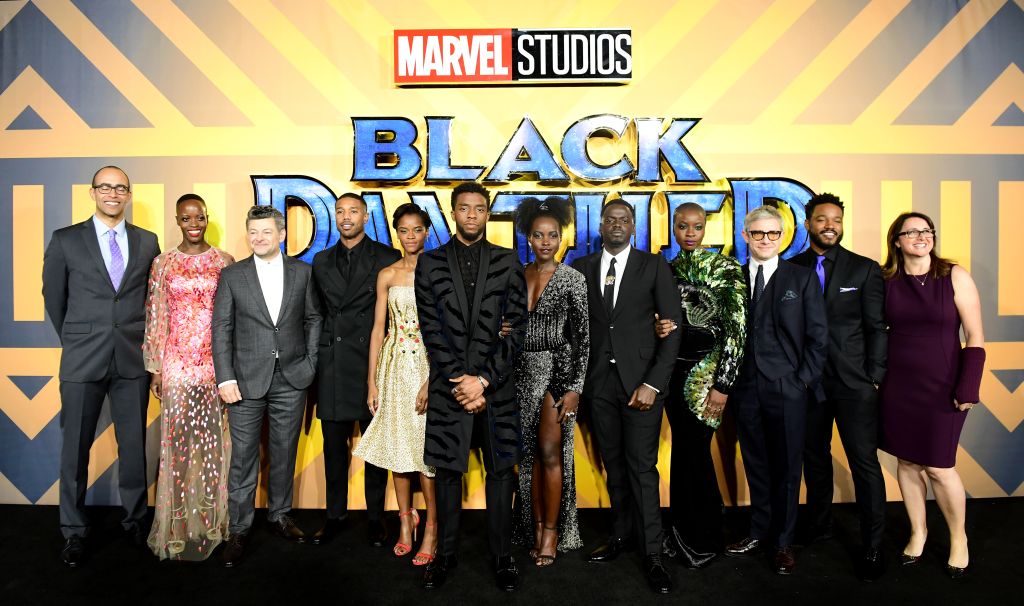
Source: Ian West – PA Images / Getty
This year, Marvel Studios celebrates ten years on the silver screen. With over 17 connected films in the universe, we’ve had our fair share of aliens, gods, and super-soldiers captivate us and take our money. Black Panther is the newest film in the universe, ushering in a new phase of heroes and shaking up the current roster.
Many nerds of color have been religiously following Black Panther coverage since Chadwick Boseman was cast as T’Challa. Boosted after his first appearance as the character in Captain America: Civil War, we have poured over countless videos and articles about the upcoming solo film. On paper, the film’s rich comic history provides an ample foundation to make a solid superhero movie. But beyond that, Black Panther has the potential to disrupt this modern genre because of one factor that helps it stand out from the other films in its league: cultural relevancy.
It should be said upfront that Black leads in the superhero genre is not a new concept. The 1990s saw Black superhero films that ranged from the comedic (Meteor Man) to the parodic (Blank Man) to the violent (Spawn). But one, in particular, set an example for what a commercially successful Black-led comic book film could look like. That film was 1998’s Blade, which starred Wesley Snipes. Loosely based on the Marvel comic book character of the same name, the film earned a cult following and garnered two sequels. As a franchise, it grossed over $400 million worldwide.
Black Panther has the potential to disrupt this modern genre because of one factor that helps it stand out from the other films in its league: cultural relevancy.
In 2000, X-Men premiered with Storm/Ororo Munroe (played by Halle Berry) as an underdeveloped, but visible, member of the team. The X-Men franchise is still going strong and is an example of the new millennium shifting the superhero genre toward films that were more kid-friendly, financially successful, and a part of larger franchises.
In 2012, the landscape of the superhero genre changed again when Marvel Studios introduced the concept of interconnected films that roll up to a larger story. We saw characters like Iron Man, Captain America, and Thor receive their own solo films, but they, and other characters, came together to form The Avengers. The film saw monster success, grossing over $1.5 billion worldwide, and it birthed what we now know as the Marvel Cinematic Universe (MCU). Some studios, like DC/Warner Brothers, have attempted to follow suit, with Justice League and the broader DC extended universe. And 20th Century Fox is planning an X-Force film following the success of Deadpool. However, as the originator of universe building, Marvel set the bar for films of this caliber and has invested in Black Panther as the next piece in the puzzle set that is Thanos and the world-destroying conclusion to the original members of the Avengers.
On paper, Black Panther can be viewed as another solo film with the purpose of setting the foundation for future Avengers films, similar to Doctor Strange or Ant-Man. But what makes it unique is that it is the first MCU film not led by a white male. The uniqueness becomes more layered when you add the fact that it has a cast that is almost entirely made up of actors of African descent. To top it off, the film is directed and co-written by Ryan Coogler, making it the first time in Marvel Studios history that a Black director is leading the story. In this modern genre of kid-friendly, comic-heavy blockbusters, we are seeing something new: Black creatives finally getting their shot to tell a superhero story from our perspective.
In this modern genre of kid-friendly, comic-heavy blockbusters, we are seeing something new: Black creatives finally getting their shot to tell a superhero story from our perspective.
And Black fans, from casual to committed, have responded with enthusiasm. Hashtags such as #BlackPantherSoLit began trending two years before the film’s release. Recently, my fellow Black Girl Nerds colleague Kayla Sutton created #WhatBlackPantherMeansToMe, which sparked a national conversation about the personal and cultural reasons why this film is not just another Marvel movie. #BlackPantherChallenge, created by Frederick T. Joseph, started off as a fundraiser to get Black kids in Harlem to see the film and snowballed into more than 200 GoFundMe campaigns that have raised over $250,000. Meanwhile, Black Panther has outpaced every superhero film before it in ticket sales on Fandango.
This level of support aligns with studies that focus on people of color and their film-going habits. The Motion Picture Association of America analyzed this and found that people of color purchased 49 percent of movie tickets sold in the U.S. in 2016—a 4% increase from 2015—due to the uptick in POC-led and ensemble films. Fandango recently surveyed 1,000 Black Panther pre-sale ticket buyers and found that 97 percent of them were looking forward to “a different kind of superhero movie.” These reports all point to the interest that moviegoers of color have in shaking up the genres they love. When you’re providing these fans with something that is not different, but something culturally personal that they can latch onto, trust and financial support are not far behind.
Last year, two Black films disrupted their respective genres and saw financial success. Girls Trip could have been dismissed as another raunchy female comedy, especially coming a month after the majority-white ensemble Rough Night, which was not financially successful. But because it gave us something different with all Black women leads, it blew box office projections and went on to become the first live-action comedy of 2017 to break $100 million in the domestic box office. It had a final gross of $140 million.
Get Out examined racism through the horror lens—something that was original to the genre. That originality paid off, with the film grossing over $250 million in the box office worldwide and becoming the most well-reviewed film on Rotten Tomatoes in 2017. Like Black Panther, both of these films shook up their genres to positive results.
When asked what inspired her to make #WhatBlackPantherMeansToMe, Sutton responded: “This film is so unapologetically Black, and growing up on the outside of the nerd community as an ‘other,’ to have a film filled with people that look like me and my family is the most amazing gift.”
With the potent combination of bringing something new to superhero films and a slew of inclusive imagery that resonates with Black filmgoers, Black Panther is destined for greatness. And with overwhelmingly positive reviews of the film pouring in, it only makes sense that this greatness will lead the charge for more culturally relevant stories for the next decade of Marvel films.
Joi Childs is a brand marketer, sarcasm enthusiast, and film critic. You can find her on Twitter (@jumpedforjoi) tweeting about the intersection of marketing, nerd, and tech.

















